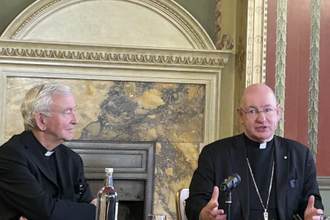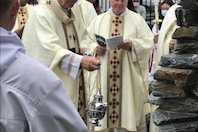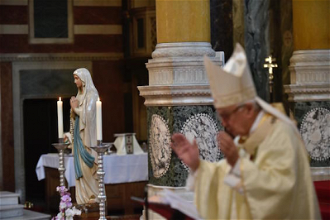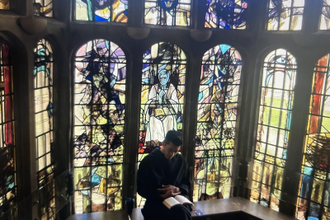Archbishop Nichols speaks at Remembering Srebrenica memorial day
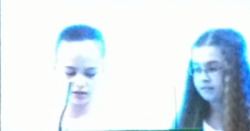
Prayers by children from Bosnia
Britain became the first nation in Europe to commemorate the anniversary of the 1995 Srebrenica genocide last night, at a special gathering in Lancaster House. Organised by the charity Remembering Srebrenica, the event was attended by politicians, diplomats, religious leaders and survivors of what has been described as 'the worst crime in Europe since the Second World War'.
During 11-16 July 1995, 8,372 Bosnian men and boys were murdered, and the mass rape and torture of tens of thousands of women took place, as they were sent with men to concentration camps by the Bosnian Serb Army of Republika Srpska. The remains of many of the dead, thrown into mass graves have now been reinterred at Potcari Cemetery.
Hosted by journalist and former MP Martin Bell, who reported from Bosnia throughout the war, and was himself injured there, special guest speakers last night were: Dr Waqar Azmi, chairman of Remembering Srebrenica; Lord Paddy Ashdown; Rt Hon Eric Pickles, Secretary of State for Communities and Local Government; Rt Hon Hilary Benn, Shadow Secretary of State for Communities and local government; Senior Minister of State Baroness Warsi; Most Rev Archbishop Vincent Nichols, Archbishop of Westminster and First Secretary of State Rt Hon William Hague MP.
The evening included a short film from Aljazeera reporting on a memorial service held earlier in the day at Potocari cemetery; music composed by Yusuf Islam (formerly Cat Stevens) a short ballet by Amadeus and a performance by soprano Aida Corbadzic of a song composed for the evening by Eric Breton. Presentations concluded with Muslim and Christian prayers recited by two young girls.
One by one, speakers expressed their anger and frustration at the lack of action on the part of the international community as the Bosnian crisis unfolded, and pledged that such a tragedy should never be allowed to happen again.
In a passionate speech, Lord Paddy Ashdown, who has had extensive experience in Bosnia as an International and EU representative there said that what had happened in Bosnia had been a "sin before every religion" but warned that this would not be the last to take place in the world - citing current events in Syria and elsewhere. He said, that like JB Priestley, he did not like memorials very much as they help people to forget the dead too quickly. "Bosnia is becoming a black hole of corruption". The country is one of the "little jewels" in Europe, he said, adding that "membership of the EU is the memorial I would like to see."
The speakers who drew the most appreciation from the audience, were survivors of the Bosnian Holocaust: two younger men and an elderly man and woman - all of whom lost virtually all their family members. One man spoke about how the Dutch UN forces had stood back from the conflict and refused to shelter refugees trying to escape from their killers. Another, farmer Hakija Husejnovic, who survived by lying under a pile of hundreds of bodies for 24 hours simply pointed to the huge picture of Potcari Cemetery on the wall behind him.
Saliha Osmanovic who had lived in a small village all her life, fled with her family to the UN safe area - which proved to be so unsafe. She described how her youngest boy was killed by a grenade. The rest of the family was taken from her. After years in refugee camps she returned to the home where she brought up her children and now lives there alone, growing vegetables and surviving on a small pension.
Baroness Warsi began her speech by expressing her shame and apologising that Britain had not done more to avert the crisis.
Archbishop Vincent Nichols said he had listened to the presentations "with a growing sense of shame and humility."
He said: "It is so important that we are reminded, over and over again, of the evil that we human beings effect. So this evening I salute and thank the many people who have made sure, by their efforts and their courage, that the events of Srebrenica are not forgotten: photographers, journalists, reporters – and I thank Martin Bell in particular – publishers and, of course those who have given us first hand witness to this genocide. Through their work we have to face the facts of what has been done. We have to ensure that these facts are never lost."
He went on to say that he believed "faith in God is not a problem to be solved, but a vitally important resource, a gift, which we have to discover afresh and use correctly.
"Religious faith casts a light on the common humanity of us all. That light deepens our understanding of ourselves, our origins and our ultimate destiny. Religious faith, understood correctly, constantly proposes to us the way of reconciliation, and makes that way a real possibility. Religious faith .. tells us that we must learn humility, repentance, sorrow. It insists that we must speak of our failure and that we must listen to, heed, the confession of fault that is made by those who have offended. Yet this speaking and hearing must be a speaking and hearing that is founded in love, love for one another. Without that love the pathway of reconciliation remains closed."
Archbishop Nichols concluded by pointing out that Srebrenica Memorial Day is also the Feast of St Benedict, the father of European monasticism. Among the saying which express the spirit and greatness of St Benedict are the words, in Latin, ‘Pax inter Spinas’ – Peace among the Spines or Thorns.
"The people of Srebrenica, as we have so moving heard, suffered greatly through the spines, the thorns, of human cruelty. May that also be a place from which peace truly grows. St Benedict is a great Patron of Europe. May the coming together of his Feast and this Memorial Day be a great sign of hope and of peace for all of Europe."
The presentations concluded with a Muslim and a Christian prayer recited by two children from Bosnia.
For more information on Remembering Srebrenica see: www.srebrenica.org.uk



